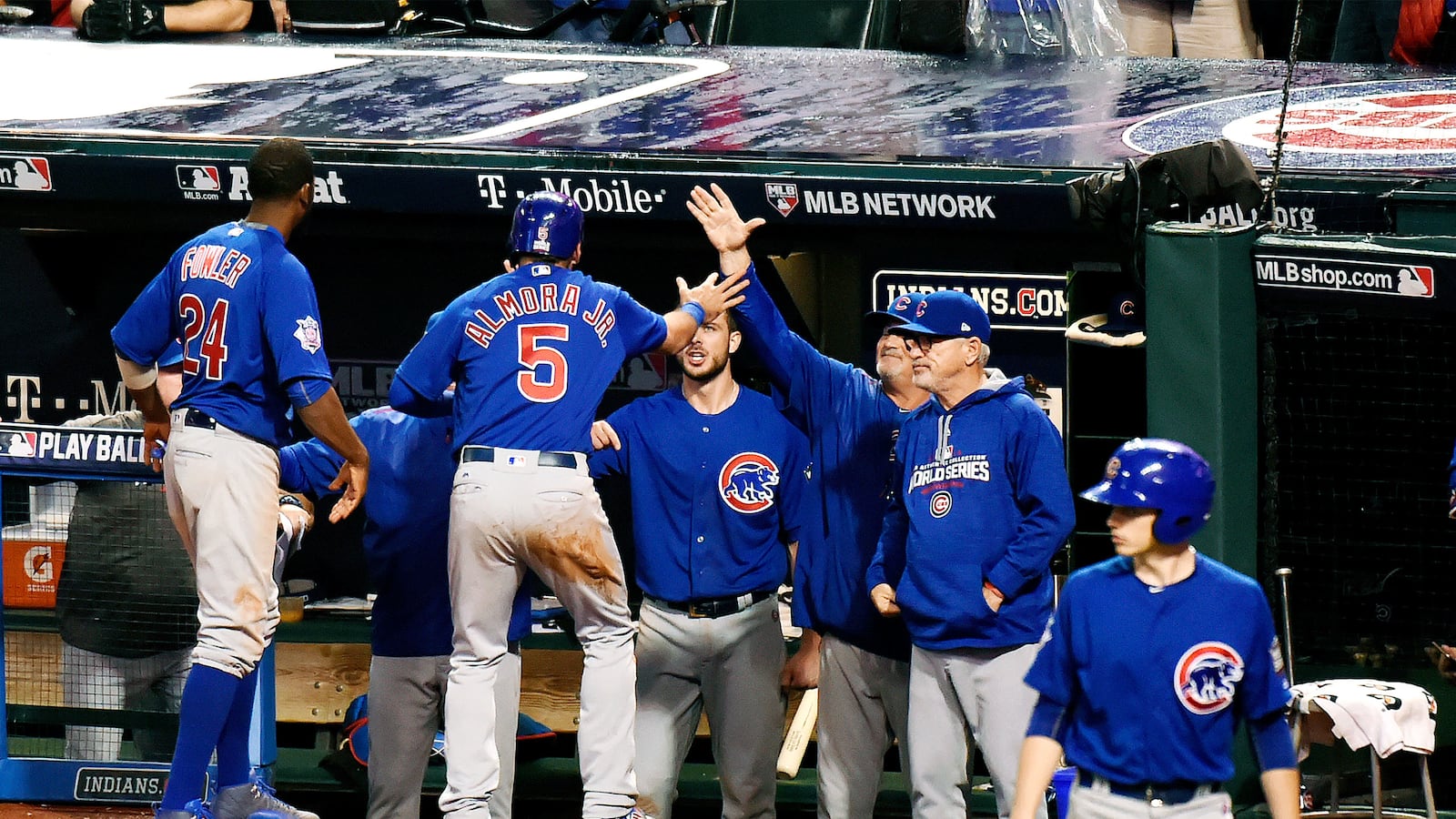About 1:30 a.m. Thursday morning—escaping the pouring rain—I’m in the Cubs’ dugout with David Ross, the Cubs’ 39-year-old catcher and team leader who was carried off the field on the shoulders of his teammates after completing his final major league game. When Anthony Rizzo told him on TV that he was “an emotional wreck” and Ross advised him “just continue to breathe,” Cub fans tried to breathe, too. Ross had given up two runs on a wild pitch that bizarrely bounced off his mask and now he’s telling me, contrary to the instructions of every Little League coach, that “I was trying to hit the [solo] homer.” It was, he says, “nice to get one back.”
As we chat about his being the oldest player ever to hit a World Series home run, he mentions how much he loves Chicago and Chicago fans—family people rooting for a team with family ownership and a family feeling among players. I babble in a way just short of embarrassing about how I had grown up within walking distance of Wrigley Field, how my late grandfather had taken my late father to the 1945 World Series and my father had taken me to my first Cubs game more than half a century ago, and how starting at age 9 I had spent my summer days in the bleachers watching the Cubs lose before passing the fever on to my kids.
Ross stands up from the Cubs bench and says: “You need a hug, too,” then wraps me in his arms, the sweet rain and sweat of his championship T-shirt transporting me home.
This is sublime and ridiculous—my childhood fantasy life made real. Nine hours earlier, I arrive at Progressive Field in Cleveland four hours before game time with a mission. I want to supplement my Daily Beast press credential, which would get me on the field before and after the game, with a little badge that would allow me in the clubhouse with the baseball beat reporters and pool camera crews. I fail, but remain undeterred.
I watch seven innings from my seat in the press box—where no cheering is allowed— and the last three from above home plate with my nephew and thousands of Cub fans who have spent a fortune buying tickets. I had no seat but we’re all standing anyway—high-fiving Cub hits, inconsolable when the Indians tie the score 6-6. Standing nearby is the man who for decades ran the hand-operated scoreboard at Wrigley Field—symbol of our heritage— but even he can’t brighten our mood during the rain delay. Then comes the glorious top of the 10th, when MVP Ben Zobrist doubled his way to Cub immortality. I tell two little kids that they could live to be 200 and never see a game like this one.
After the last out, I bolt down the ramps. I can’t get through the throng to the field until a merciful Cleveland security guard lets me walk precariously on top of the length of the slippery Indians dugout. Suddenly I’m streaking into fair territory, nearly touching third on the way to the mound where I almost run down Anthony Rizzo—who has pocketed the game ball—and shake his hand amid the bedlam. Rahm Emanuel, who also grew up near Wrigley, is giving me the high hand clasp with his right hand, the one with the missing middle finger. I get a bear hug from John Cusack and suddenly we’re talking joyfully with Bill Murray and Michael Wilbon about the epic dimensions of what we have just witnessed.
“It’s Moby Dick,” Cusack says.
Wilbon is trying to rank the game with other historic World Series finales—Joe Carter’s walk-off home run for the Blue Jays to win the 1993 World Series in Game 6, or Bill Mazeroski’s homer to win it for the Pirates in 1960. No walk-off here, but this one was Game 7, extra innings, epic comeback from a 3-1 hole, near-Bartman-style collapse in the 8th, and of course, the curse. Always the curse, except now, tonight, always turns out not to be forever.
Cusack broadens the conversation. “It’s top five all-time,” he says, with Murray nodding assent. “There’s the Rumble in the Jungle” (Ali versus Foreman), Jesse Owens at the 1936 Olympics.” I offer the 1980 Olympics, where the U.S. beat the Soviet Union in hockey. After 108 years, Cub fans finally believe in miracles, too.
As the rain starts and the players go into the clubhouse with their ski masks to spray champagne, we settle in the dugout with Eddie Vedder, who wrote the beautiful song “All the Way” about the Cubs, Bonnie Hunt (who tells me she has attended every Cubs opening day since 1977), Chris Chelios, the retired Black Hawks defenseman and faithful fan who looks like a movie star, and the wives of several players, who didn’t want the kids in tow to get doused in the clubhouse revelry.
The players, now on the field for more rainy celebration, begin surging back into the clubhouse. “Top five events,” Cusack tells Epstein. “In human history,” Epstein jokes. Suddenly the line reverses direction and the entire team, including senior management that built the best farm system in decades, is moving en masse to the mound, watched from the stands by a few hundred lingering Cub fans who no longer need to think of themselves as die hard because our team didn’t die. Epstein is in fine form, shouting: “Minor league free agency starts tomorrow. Let’s get back to work!”
A guard still stands at the dugout door to the clubhouse and by this time no reporters are allowed, including those with the badge I’d coveted. But a friendly Cubs official engages me in conversation with such familiarity that I look like I belong. I’m in. It’s 2:15 a.m. The celebrities have gone home and it’s just happy, very young players—deep into their social media—hanging with their families and friends. I see only one other reporter, talking to Mike Montgomery, the reliever destined for millions of YouTube views of the last out.
Kyle Schwarber, who evokes a nicer Babe Ruth, tells me he was in “100 percent doubt” that he’d be playing in the World Series until the doctor surprised him by clearing him to hit, though not field. How did he lay off pitches and find his timing after missing almost the entire regular season? “Adrenaline, man.” While fans worried about his still-not-fully-healed ligaments gasped as he slid into second base tonight, Schwarber, bending low for hide-and-go-seek with his two-year-old niece, thought the hard slide was fine. It helped convince him he was healed.
Aroldis Chapman, the ace closer who fled the field in tears after giving up a double and a two-run homer, is talking in Spanish with his interpreter Santiago and other friends, his girlfriend and their infant in a stroller. Chapman has H-A-T-E tattooed on four fingers and L-O-V-E on the other four, and the latter better match his contented mood, that of man who escaped a harsh historical fate if the Cubs had lost. Rookie Carl (C.J.) Edwards Jr., the closer of the future, tells me he assured Chapman during the rain delay, “I got your back”, and he did, retiring the first two batters in the 10th.
Edwards had someone watching his back, too. “I said, ‘Look, C.J., just go out there and be you, and I pounded his chest,” Jake Arrieta, who was warming up in the bullpen, confides. Arrieta is not just a Cy Young winner but a trenchant 3:00 a.m. analyst, explaining that hitters have only 125 milliseconds to react to a pitch while it takes 400 milliseconds to blink. Talking about the prodigious soon-to-be-All Star skills of Willson Contreras, just one of so many great young Cubs, he says “it’s like he’s got springs built into his shoes.”
Theo Epstein is looking over some ancient shrimp in a steamer tray as the players dress for the 3:30 a.m. bus to the airport. “These guys stick together,” he tells me. “When you stick together and love each other….” He doesn’t have to finish the sentence. During the now-legendary 17-minute rain delay, the players all crowded into the weight room and Jason Heyward gave a pep talk. One of the many reasons manager Joe Maddon is revered by his players, Arrieta had told me when I saw him mid-season, is that he only calls three team meetings a year: once before Opening Day, once at the All-Star break and once before the playoffs. He wasn’t going to break that now, so he went to check the weather while players talked.
But Epstein was there and he gives me his first account of what will now enter baseball lore. “They kept saying to each other, ‘We got this’. Instead of wallowing in it, they were picking each other up,” Epstein says. “It was a beautiful sight.”
When I suggest that winning is a habit that had never been acquired by the Cubs of the past, who tended to wallow, he grows agitated. “This is just as much for Ernie [Banks], Ron Santo and Billy Williams.” He gets even more heated when I point out the obvious, that he’s ended historic droughts twice now, in Boston and Chicago. (I know better than to mention that he’s bound for Cooperstown).
“It’s not about me,” he says vehemently, and he means it. “A great organization is a thousand little sacrifices when no one’s looking—a scout traveling 100 miles out of his way to see a prospect, the stat people up all night—it takes everyone.” I say that the world will now want his lessons on leadership. “All that business school leadership stuff is bullshit,” he tells me. If there’s a secret, it’s to “keep deflecting credit, keep from blaming. Live your fucking life and be nice to people.”
On that note, I floated out of Progressive Field, the last to leave except a few Japanese reporters, on deadline four floors up in the press box.

